
AI reshaped how customers choose. Is your 2026 plan ready?
The rules of customer discovery have changed, again. If your 2026 plan doesn’t account for AI, social algorithms, and new search behavior, you’re already behind.

The world as we know it has changed forever. Or has it?


The effects of COVID-19 were immediate and felt by every industry and business across the globe. Customer behaviors and expectations changed overnight as fear and anxiety swept through communities, resulting in pandemic trepidation. Some businesses struggled to restock products that were flying off shelves, while others were directed to lock their doors and go home.
Events and experiences of all types – especially traumatic ones – shape customer behavior, expectations, and needs. Since the initial onset of COVID-19, analysts and forecasters predicted that buyers’ behaviors would change for good, and businesses would permanently change – pivoting from prioritizing convenience and cost to safety and wellbeing. Following suit, automotive brands began reimagining how they could incorporate mask holders and anti-microbial features into vehicles. Brick & mortars started redesigning spatial layouts and offering curbside experiences.

But instead of latching onto a single line of thinking and blindly following the suggested “new normal” best practices for our clients and their customers, we took pause. How do you validate where you really want your business and the experiences you craft to go? Is incorporating health and safety precautions more important than overburdening the customer? Do you continue to invest in something without first confirming it’s what customers really want?
Best practices are guidelines to be referenced, not hard and fast rules. In fact, innovators and market leaders who want to implement experiences of tomorrow shouldn’t be followers. Curiosity and critical thinking should lead the way. Uncovering pockets of opportunity that can change market strategies and transform experiences should be the goal.
That’s why we gathered insights to facilitate a different type of conversation. Is safety indeed the number one priority for customers across demographics and customer groups moving into a post-pandemic world? Or will businesses see digital experiences abandoned and customers eagerly flooding their physical stores?
We have to admit, the results of our research surprised us. And they might surprise you, too.
The Data-Driven Insights Into Evolving Customer Experience Report relied on quantitative research, surveying 1,010 individuals ages 24-65+ from across the U.S. through the Harmon Research consumer panel. Respondents were asked a series of questions in order to understand changing customer behaviors, perceptions, and needs before, during, and after COVID-19.
The online quantitative survey was conducted in April 2021. Some of those surveyed work from home, while others work in an office. Income levels varied, as well.
1,010
Individuals surveyed from across the U.S.
24-65+
The average age of individuals surveyed about their COVID-19 experience
Customer behavior changed as a result of the pandemic, but not as starkly as we initially believed it would. While respondents willingly tried several new customer experiences during COVID-19, they also yearn to return to in-person experiences that were the norm in 2019.
Convenience is still King when it comes to developing experiences that meet customer expectations and needs. Despite many brands focusing on health and safety, survey respondents clearly identified convenience as their top expectation and need. Safety came in second with all age brackets, with the exception of Gen Z.

Majority of respondents who used digital experience provided by businesses during COVID-19 reported a more favorable impression of the business, proving that flexibility to choose their own “adventure” is essential for the post-COVID customer.

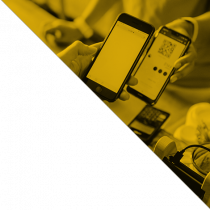
More than half of respondents said they want to return to in-person experiences once COVID-19 is over. This highlights a need for brick & mortars to connect in-person with digital experiences in stores to offer one cohesive, seamless experience that empowers customer engagement, value realization, and increased brand affinity.

Interest in accessing experiences that are solely digital decreases with age – typically dropping off starting with the 45-54 age demographic. Sixty-six percent of respondents 55 and older reported no desire to continue any type of digital experience post-COVID-19. This highlights a growing need to personalize experiences and provide education by persona groups and digital literacy in order to drive greater adoption and long-term engagement.
Convenience is still King when it comes to developing experiences that meet consumer expectations and needs. Despite many brands focusing on health and safety, survey respondents clearly identified convenience as their top expectation/need. Safety came in second with all age brackets except Generation Z.

Majority of respondents who used digital experience provided by businesses during COVID reported a somewhat or much more positive impression about the company providing it, proving that allowing consumers options to choose their own “adventure” based on their preferences and time restraints is essential for the post-COVID consumer.


More than half of respondents said they want to return to doing everything in-person once COVID is over, which highlights a need to bring digital transformation efforts into storefronts to connect the experiences and offer one cohesive, seamless experience that empowers customer engagement, value realization and increased brand affinity.

Interest in accessing experiences exclusively digitally decreases with age, typically dropping off starting with the 45-54 age demographic. 66% of respondents 55 and over reported no desire to continue any type of digital experience in a post-COVID world. This highlights a growing need to both personalize experiences and provide education by persona groups and digital literacy to drive greater adoption and long-term engagement.
How should your business continue driving and investing in digital transformations as customers leave their homes and embrace the COVID-19 reentry phase? Download our industry insights below to use while crafting a holistic plan.
Want more industry insights? Download our full report.

“Experiences are what draw customers into a brand and keep them hooked over time. It’s the strongest differentiator and next competitive frontier for brands. Markets are disrupted and new markets are created when a new entrant is able to take CONTROL of the experience. Making an investment into your experience today will enable you to control the experiences of the future.”
Jesus Ramirez
Vice President of Strategy & Innovation
So, our survey results ended up challenging predictions made by larger organizations in 2020 and even early 2021. But the fundamentals for crafting and driving excellent customer experiences are only reinforced by the survey results. Business leaders and changemakers dedicated to prioritizing, strategizing, and implementing new experiences for the post-COVID customer should keep five things in mind as we progress further into the pandemic’s reentry phase:
Because of COVID-19, customers have become a lot more familiar with and accepting of digital experiences. This provides organizations and companies with opportunities to improve and streamline the overall experience for employees and customers by digitizing what was traditionally done in person.
Personalization is now a key factor in driving customer loyalty. Providing individualized attention helps remove digital barriers and build emotional bonds with customers by giving them the control back and making them feel understood and valued.
Many companies and organizations across industries struggle with customer retention and engagement, which prevents customers from realizing the full value of their services or offerings. By improving educational offerings (personalized to meet the needs of different customer groups) and increasing learning opportunities through omnichannel marketing, brands can help customers discover, navigate, adopt, and engage with services, products, and/or offerings faster and for longer periods of time.
As our research suggests, people are ready to return to in-person experiences. But that doesn’t mean companies and organizations should halt digital transformation. Instead, it’s important to bridge in-person and digital experiences by implementing digital transformation strategies into the physical spaces to create cohesive brand experiences, rather than differentiated ones.
Data is the key to unlocking cross-functional alignment, agile decision-making, and unstoppable momentum when it comes to customer experience design. By ingesting, aggregating, and analyzing first, second, and third-party data, companies and organizations can better target, personalize, and customize content to satisfy ever-evolving customer needs.
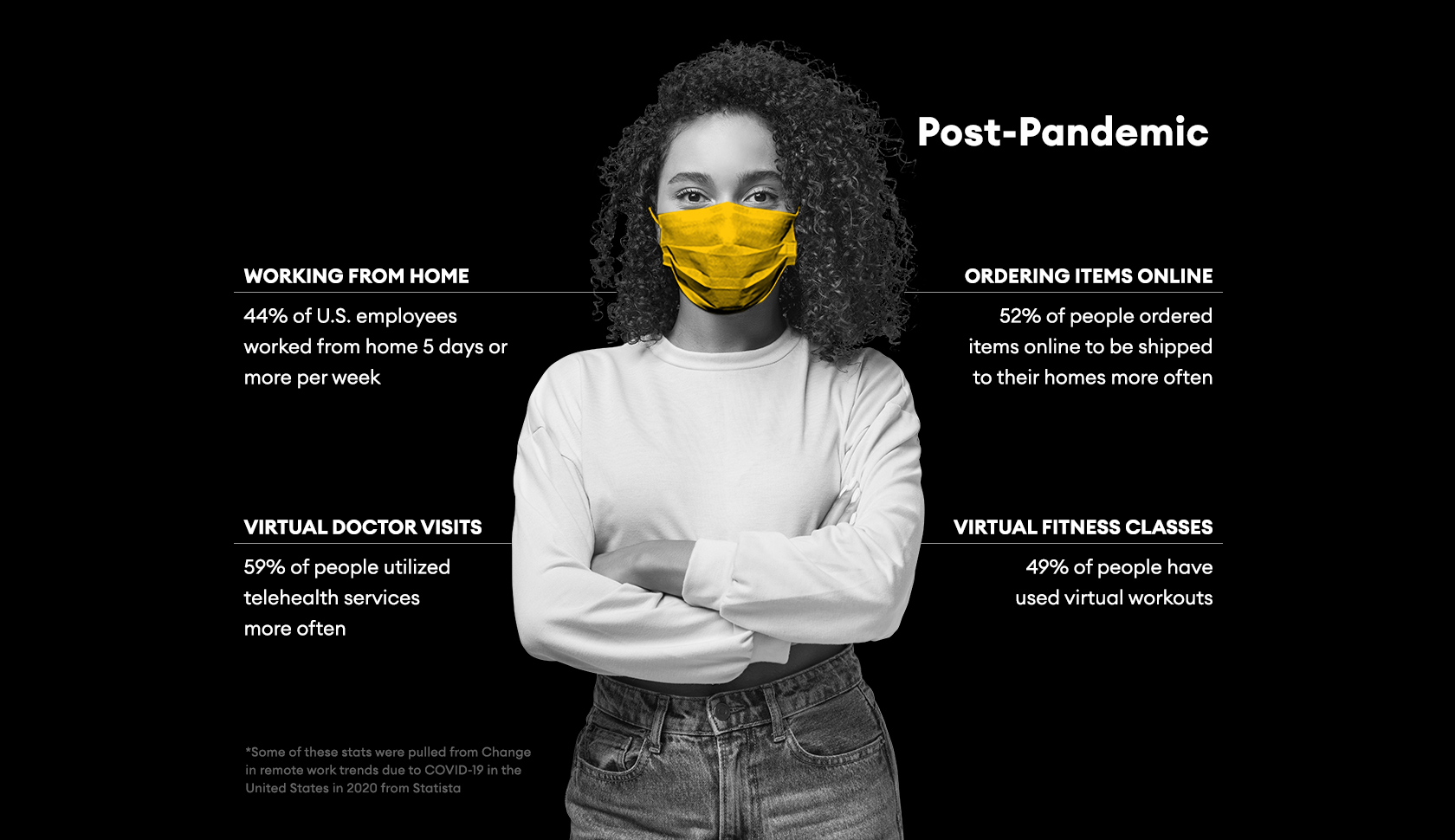
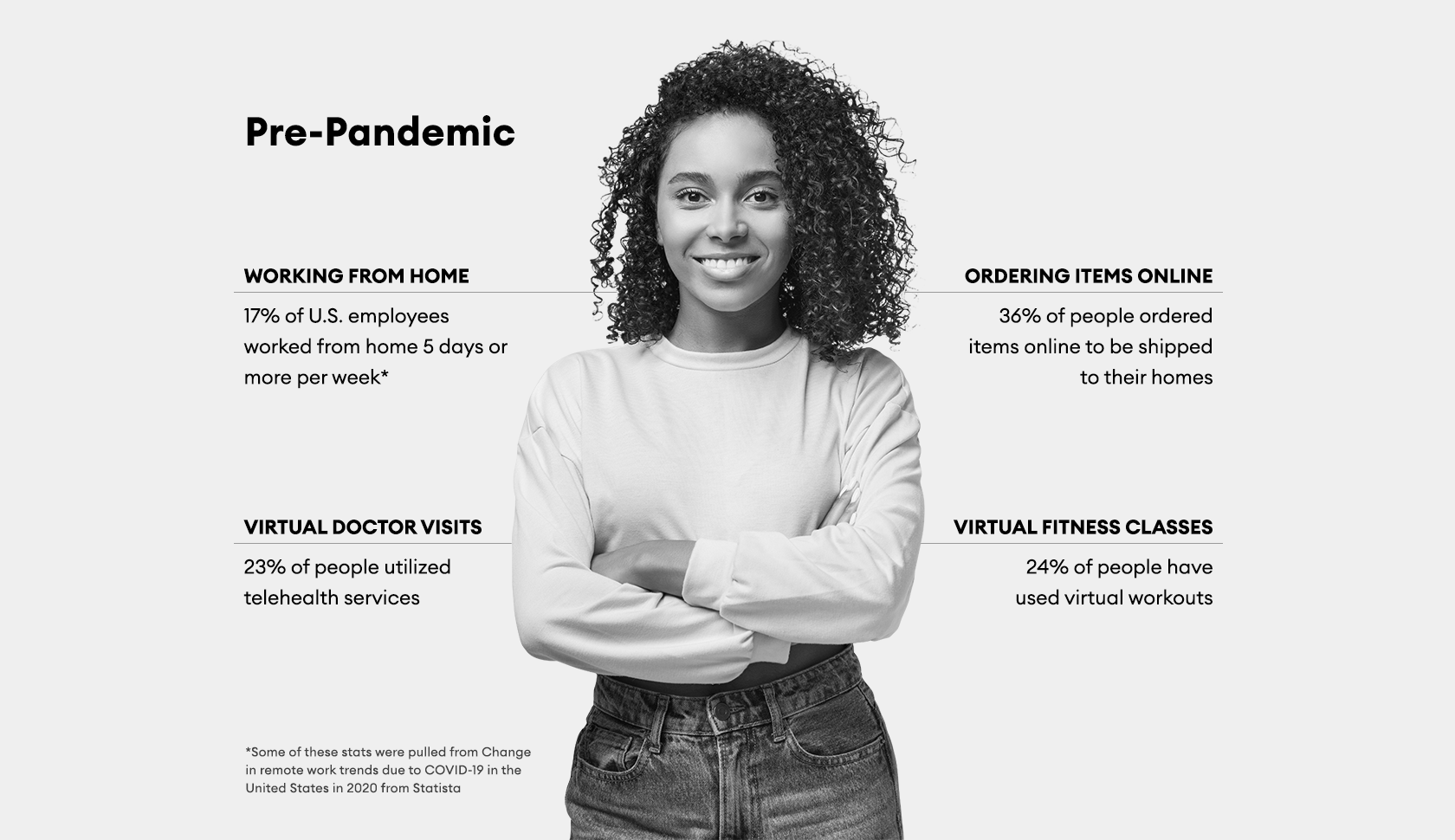
This graph represents the percentage of respondents who utilized specific digital experiences more during the pandemic than they did before.
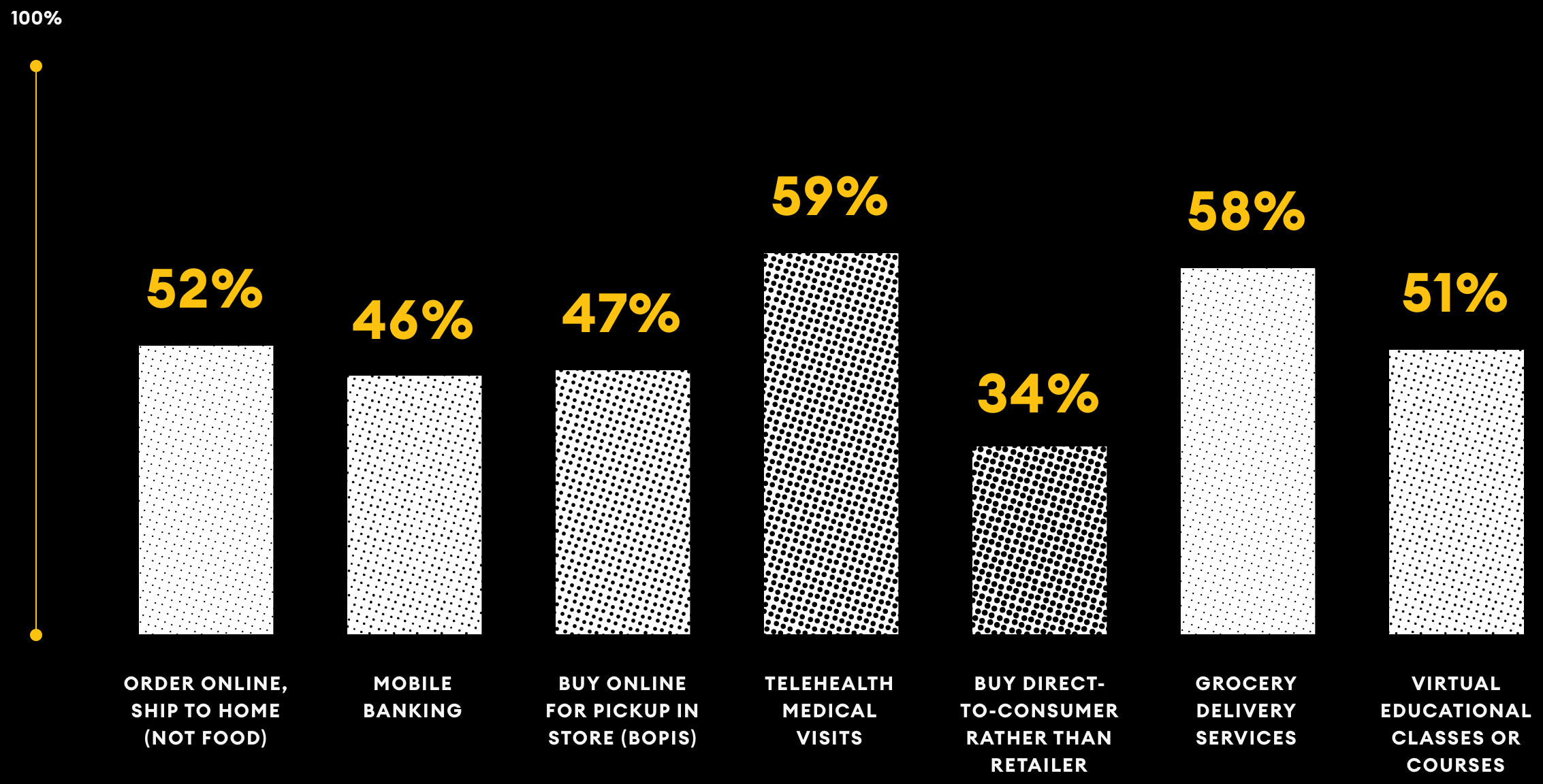
Despite living through a viral pandemic for the past year, what customers still value most in their experiences is convenience. Whether in-person or digital, the customer experience must be easy, pleasant, and frictionless, with value being delivered and realized in a short amount of time. Affinity for supporting local businesses and avoiding human interaction will no longer drive purchasing behaviors for the post-COVID customer, according to our survey results.
Safety, though, does have its place. In fact, survey respondents voted safety the second most important factor for customer experiences in most age brackets (excluding Gen Z). This new information calls for businesses to shift their thinking and look through a new, slightly different lens – one in which experiences are designed with convenience as King, and safety, security, and certainty as “new normal” best practices.
41%
Price and cost savings still played a factor, averaging 20% of respondents’ primary vote. Older customers were more likely than younger to choose “safer”as a primary benefit.
Our survey respondents also showed significantly more enthusiasm and affinity towards in-person experiences than we expected. Many anticipated that – after a year of digital-everything – customers would covet the internet for making their lives and daily routines easier. Businesses across industries were forced to speed up digital transformations by five years (simply to remain relevant and stay afloat), and because of customer adoption and preference to digital-first, it was expected that the trend would continue.
But it seems everyone is tech fatigued. While some survey respondents said they plan to continue with digital experiences (grocery shopping delivery ranked higher on that list), 10% said they plan to go back to doing everything in-person once the pandemic ends. Only time will tell whether that desire for in-person activities will persist. Running errands and dealing with customer service lines can lose their appeal pretty quickly.
50%
As we saw earlier, 85% reported using mobile banking during the pandemic, and close to half of those said they used it more than before the pandemic. However, on the flip side, it’s important to note that half of respondents said they want to return to doing everything in person, post-COVID.

So, as people venture out of their homes and in-person business bounces back, should the digital-first transformation be put on pause? No. Many companies may do that. They may be forced to, so that they can recoup some of what they lost, but for others, it’s an opportunity to become leaders and pioneers in delivering exceptional hybrid experiences. Because one day soon, there will be no differentiated experiences. In-person and digital will (or should) be one in the same.
With this, leaders are called to empower internal teams to be change makers and use this reentry phase as an opportunity to be one of the first to offer cohesive, connected hybrid experiences. When done right, it’s these that will drive differentiation, fuel business growth, increase customer engagement, and empower ongoing value realization. Because innovation is the key to unlocking unstoppable momentum.
Now is the time, and experience is everything.
Our client had a goal of growing revenue from $3 billion to $10 billion in five years. Learn how we used consumer insights & competitive research to set the vision & rally stakeholders around new future state plans.

There are efficient and effective strategies that can be employed by any industry to identify gaps or opportunities throughout the customer journey and brainstorm for innovative solutions to meet the post-COVID customers’ needs.
Some common practices used at Tallwave to help brands optimize the conversion journey, reduce churn, accelerate value realization, acquire new customers, and expand into new markets include holistically mapping the customer experience; redesigning specific elements of the user journey; conducting qualitative and quantitative research to inform core consumer group and competitive market decisions; facilitating design studios to help teams envision and implement tomorrow’s experiences; utilizing proprietary tools to breakdown data silos; and optimizing performance marketing strategies to increase customer engagement, share of voice, and overall brand awareness. We’re ready to help you craft an exceptional customer experience and unlock unstoppable momentum. Are you?

The rules of customer discovery have changed, again. If your 2026 plan doesn’t account for AI, social algorithms, and new search behavior, you’re already behind.

Do you understand the differences between UX and UI? See how these crucial elements blend aesthetics with functionality to create seamless digital experiences.
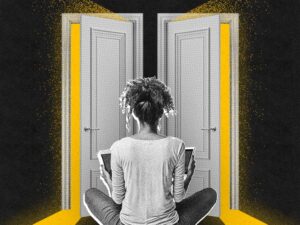
A/B testing is a fundamental practice for marketers and businesses looking to optimize digital experiences and maximize performance. Learn more in our guide.
©2020 Tallwave LLC. All rights reserved.
Doing some things and making some impacts